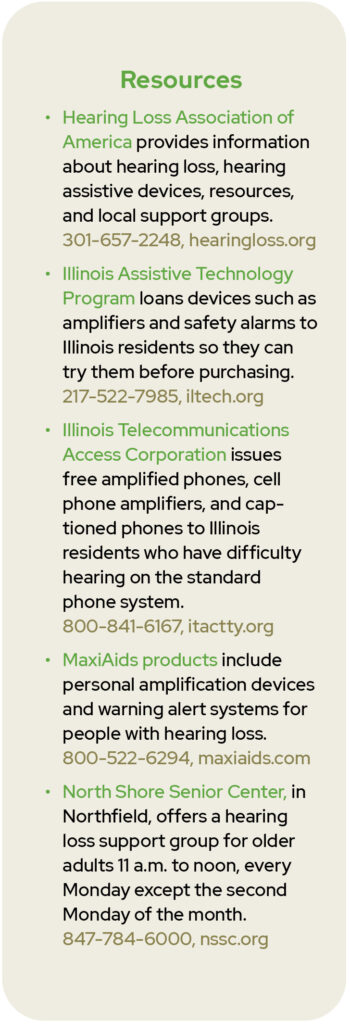Hearing aids and support groups help people counter hearing loss
Picture the scene: A person with hearing impairment claims they don’t have a problem. They say they can hear perfectly fine, if only others stopped mumbling all the time. Meanwhile family members — tired of endlessly shouting or repeating themselves — plead with their loved one to get hearing aids, to no avail.
The fact is, older adults commonly have challenges with hearing loss. About one in three people ages 65 to 74 in the U.S. experience hearing loss, according to the National Institute on Deafness and Other Communication Disorders. That figure jumps to 50% for those over age 75. An estimated 28.8 million American adults could benefit from wearing hearing aids, but less than 30% of people 70 and older have used the devices.
Types of hearing loss
Hearing loss happens due to the natural physiological changes of aging. In addition, genetic factors or exposure to loud noises for an extended period of time can contribute to age-related hearing loss.
June McKoy, MD, an academic geriatrician at Northwestern Medicine, says that when older adults begin to experience hearing loss, they should consult with a healthcare provider to determine if the underlying cause can be treated. For instance, providers can remove a buildup of earwax or adjust medications that may be causing hearing loss.
Hearing loss on only one side could result from a benign tumor, called an acoustic neuroma, McKoy says. Removing the tumor can restore normal hearing.
People who hear ringing, buzzing, or other noises in one or both of their ears, called tinnitus, should also consult a physician because the condition correlates with hearing loss.
When hearing loss goes untreated, it often negatively impacts a person’s well-being and quality of life. Hearing loss can lead to lower self-esteem, lower confidence, anxiety, depression, and isolation as the person loses contact with the world around them.
Landmark research in 2011 showed an association between hearing loss and decline in cognitive ability. When people have difficulty understanding conversations, they may isolate themselves, leading to a lack of socialization. This can deprive their brain of stimulation and contribute to an increased risk of dementia.
Hearing aid issues
While treating hearing loss is crucial, many people stop wearing hearing aids because of problems with the devices. Audiologist Lisa Gumina, AuD, founder and owner of Finer Hearing in suburban Woodridge, says she frequently hears such complaints.
“Buying hearing aids is not just a one-time, stop-and-shop purchase,” says Gumina, who provides hearing tests and hearing aid fittings in people’s homes or senior living communities.
 “Hearing aids are not like glasses that improve eyesight when you put them on,” she says. “Hearing loss is different for every person, so we have to adjust
“Hearing aids are not like glasses that improve eyesight when you put them on,” she says. “Hearing loss is different for every person, so we have to adjust
the sound to make their brain happy.
We might start with a lower level of sound at first and then increase it gradually so they get used to it.” It can take up to eight months for a person to find the right hearing aids and settings, she says.
Hearing aids can be expensive, though, with costs ranging from $1,000 to $6,000 per pair, or more. While health insurance may cover hearing evaluations, policies typically don’t cover the cost of hearing aids.
Support groups can help people address problems with hearing loss. “Everyone’s hearing loss is different,” says Ana Pinshower, facilitator of the hearing loss support group at the North Shore Senior Center. “This is a safe place for individuals to talk about how hearing loss has affected them, to vent about their frustrations, and talk about their successes.” Members share their knowledge with others, she says.
While a person with hearing loss may feel isolated, a support group can provide understanding along with comfort and socialization. And with time — and some trial and error — people can find solutions and hear some good advice.


